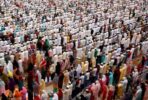I refer to the Manpower Ministry’s letter, “Impractical to make all key festivals public holidays” (Feb 14). Perhaps, the consideration is how it could be hard for Singapore to be competitive if we have too many holidays.
Our fierce economic competitor, Hong Kong, has 17 public holidays, though, and the Chinese territory has no problems remaining one of Asia’s best economies, often beating Singapore in economic rankings.
Unlike Hong Kong, Singapore is multiracial. So during this Chinese New Year, for example, those from the other races might be working.
This is true for services that must run throughout the holidays, such as public transport, our airport, the checkpoints and some supermarkets.
Hong Kong, as a homogenous territory, has the luxury of providing holidays for both major and minor occasions; the residents take their breaks and return to work refreshed.
Perhaps, overworked Singaporeans would be better off having holidays that make everyone happy. Every racial community is an important cog in our economy.
With less annual leave left, just so they can attend an important religious or cultural occasion, some Singaporeans may end up feeling less refreshed.
Further, more holidays means that the ever-important and growing tourism industry has more reasons to bring in foreign visitors.
For example, Thaipusam is a crowd-puller in Malaysia. Were it made a public holiday in Singapore, with the entire road for Hindu Singaporeans to perform their procession, there may be many tourists preferring Singapore as a holiday destination instead.
But it seems we want workers to work more days when it would be better to earn the tourist dollar, let our Hindu friends enjoy their religious festival, and for the rest of us, a well-deserved break.
The ministry should rethink this issue. What happened in 1968 is no longer relevant; we may have needed to make compromises then for our young nation to become an Asian Tiger, but we are at the top now.
More holidays does not necessarily mean a slow or weaker economy as Hong Kong has demonstrated.
Source: www.todayonline.com







